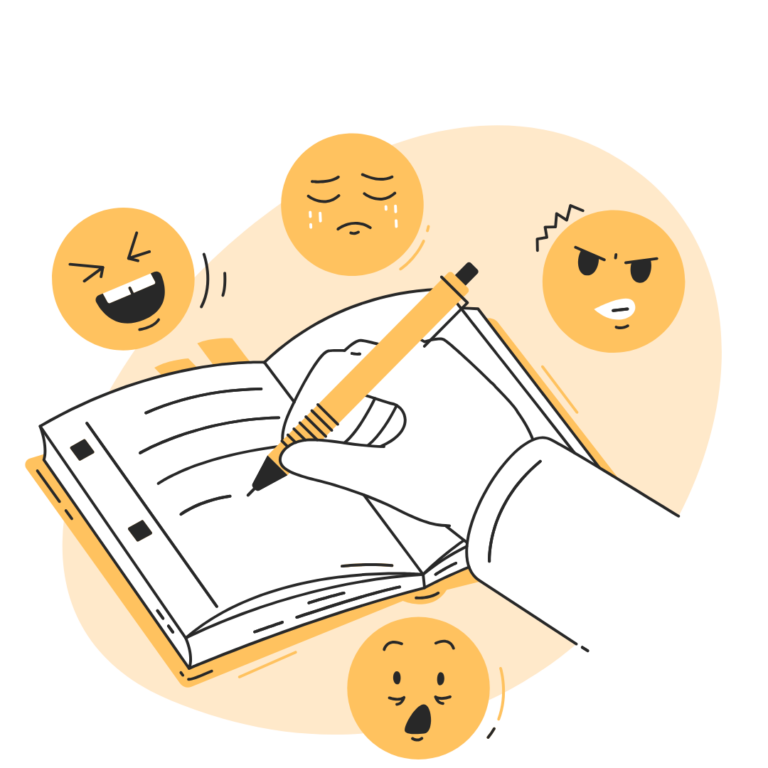Sometimes writing out your feelings does help. According to the WebMD website, journaling reduces anxiety, creates awareness, helps regulate your emotions, and encourages opening up about your problems and reaching out for support.
Before we go any deeper into this topic, what is journaling? Journaling is when you record your thoughts, feelings, objectives, and more in the form of a video, in a diary, or whatever your heart desires. Now, getting to the important part: this act of writing down your feelings regularly results in reduced anxiety levels and increases awareness because through this activity you’re consciously thinking about how you feel and are connecting with yourself by taking a few minutes out of your day to think about your goals, your mental health and wellbeing, your day, absolutely anything that will help you get to know yourself better.
In addition, journaling can be used as a medium to keep you accountable for your goals and aspirations. You can make lists about all the different things you want to do in the span of the next 24 hours, or, you could even write down or draw out your long-term goals. There are no guidelines or rules for journaling; do whatever feels right. But, do consciously try to at least jot down something in it every day for a few minutes or so if you’re wrapped up with work.
Another benefit of journaling is that it gives you clarity and helps you focus on the things that are most important to you. Taking time to understand yourself through writing in a journal or diary of some sort is much more powerful than you realize. According to Erin Greenawald on SkillShare, writing things down and speaking out loud to yourself allows you to work through decisions you’ve been uncertain about and even helps you understand your needs and certain parts of your life you need to work on.
Now that we’ve gone through all of the benefits of journaling, let me introduce you to some of the different types of journaling you can practice:
- Art Journaling: Unleash your inner creativity by using whatever colors, shapes, or patterns you desire. According to Greenawald, art journaling helps in developing your style and collecting visual inspiration!
- Bullet Journaling: This specific type of journaling is an organized list of activities or goals and it indicates what the goal on your list is and what level of completion it is at.
- Reflective Journaling: In this type of journaling, you write down your thoughts, fears, and more. This is a healthy practice in which you’re able to brain dump everything you’re feeling onto a page instead of letting it pile up and affect your daily life.
- Gratitude Journaling: This version of journaling is exactly what it sounds like. Writing down a list of everything in your life that you’re grateful for can put your feelings into perspective, helping you realize that positive things are abundant in your life as well.
- Mood Journaling: This is again, pretty self-explanatory; mood journaling is a practice in which you track your mood throughout the day. This can lead to a heightened self-awareness by recognizing what triggers your bad moods and reactions.
Of course, there are many, many other types of journaling that you can practice, I’ve briefly explained the kinds that I thought were the most beneficial!
Last but not least, I understand that journaling can be a bit daunting, so, here are a few journaling prompts to get you started:
- What are your goals for the next month? What will you do to achieve them?
- How have you been feeling lately?
- What are 5 things you’re grateful for? (try to name different things each time you answer this question)
- Who do you want to be? Why do you want to be that person and what can you do to become them?
- What makes you proud of yourself?
- What have you done to treat yourself today? (if you don’t have an answer this is your sign to go do just that)
- What are your top 10 priorities?
I hope this urges you to start your journaling journey! And remember, try your best to do this every day, we all have busy days but make sure to put your mental health first.
Written By: Poorvi Deshpande, Mental H2O Youth Resource Writer


